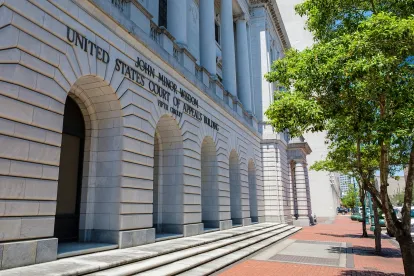In a landmark decision, the Fifth Circuit struck down the U.S. Securities and Exchange Commission’s (SEC) primary mechanism for enforcing the nation’s securities laws. In Jarkesy v. Securities and Exchange Commission,[1] a divided court held that the SEC’s use of administrative hearings was unconstitutional because it violated the right to a jury trial, represented an unconstitutional delegation of Congress’s legislative power, and violated the “Take Care Clause” of Article II. Unless overturned, the decision will be a sea change in both the regulation of the financial industry and administrative law. After all, the Fifth Circuit departed from long-standing precedent and threatens to upend decades of SEC regulatory action.
I. Background
Nearly 90 years ago, Congress delegated to the SEC the power to regulate and enforce the nation’s securities laws. The SEC exercised this power by establishing a system of administrative hearings that are overseen by administrative law judges (ALJ). Every court until now has held that these hearings are a valid use of SEC power.
Jarkesy involved one of these hearings. Two petitioners—a hedge fund manager and an investment advisor—were accused of committing fraud under the Securities Act, the Securities Exchange Act, and the Advisors Act. The two had worked together to set up two hedge funds, and then signed 100 investors with $24 million in assets.
When irregularities surfaced, the SEC launched an investigation and eventually commenced an administrative action against petitioners. After an administrative hearing, the ALJ found Petitioners had violated securities laws and ordered (1) the hedge fund manager to cease various securities industry practices, (2) both petitioners to jointly pay a civil penalty of $300,000, and (3) the investment advisor to disgorge $685,000.
II. The Fifth Circuit
Petitioners appealed the Commission’s decision to the Fifth Circuit, which struck down the SEC’s decision as unconstitutional on three grounds.
A. Right to a Jury
First, the Court held that the administrative hearings violated the Seventh Amendment right to a jury trial. The Court reasoned that the Seventh Amendment guarantees a right to a jury trial “at common law.” Courts have traditionally held that “private rights” that were protected at the common law must be heard by a jury, while “public rights” can be decided without one.
The public-private right debate was at the heart of the Court’s opinion. The Court found that securities fraud was a private right because it was “quintessentially about the redress of private harms.” The Court drew analogies to the common law rights in fraud and actions in debt and decided there was no public right that would excuse the right to the jury. In making that decision, the Court held that codifying a private right did not transform it into a public right.
B. Improper Delegation of Power
The Court also took the extraordinary step of finding that Congress had improperly delegated its legislative power to the SEC. This “non-delegation doctrine” rests on the idea that Article I of the Constitution gives Congress (and only Congress) the power to create laws. Congress can delegate some of its power, but it must provide “intelligible principles” to guide that delegation. The doctrine is unpopular and rarely used—the Supreme Court has used it only three times.
The Fifth Circuit nonetheless dusted off the doctrine and held that Congress failed to provide an “intelligible principle” for choosing whether to use juries or ALJs to adjudicate violations of the securities laws. The Court held that Congress offered no guidance whatsoever, which was therefore an unconstitutional delegation of its authority.
C. Protections for ALJs Violates the Take Care Clause
Finally, the Court held that the SEC had violated the Take Care Clause of Article II of the Constitution. This provision requires the President to “take Care that the Laws be faithfully executed.” The Supreme Court has held that this provision guarantees the President adequate power over officers’ appointment and removal.
The Fifth Circuit first established the amount of control the President had over the ALJs. Relying on a recent Supreme Court decision, Lucia v. Securities and Exchange Commission. [2], the Fifth Circuit held that SEC ALJs are “inferior officers” for purposes of the Take Care Clause because they have substantial authority within SEC enforcement actions [3]. The Court deemed that this meant the President needed to “take care” that these “inferior officers” were faithfully executing the law.
The Court then held that the layers of SEC administration prevented the President from adequately and directly supervising these ALJs. Specifically, SEC ALJs can be removed only by the SEC Commissioners if good cause is found by the Merits Systems Protection Board (MSPB). The SEC Commissioners and MSPB members can be removed only by the President for cause. In other words, an ALJ cannot be removed unless there is “cause” for removal and the President cannot remove the person making that “cause” determination unless there is a separate “cause” for removal.
III. Impact of the Fifth Circuit’s Ruling
If the decision stands, it would severally hamper the SEC’s enforcement efforts in in the Fifth Circuit (which includes Texas, Louisiana, and Mississippi), effectively preventing the agency from using its established mechanisms to issue civil penalties in those states. Instead, all such enforcement actions would have to be brought in federal court.
The decision also calls into question nearly all administrative agency action. Dozens of federal agencies use similar processes, including the Environmental Protection Agency, Commodity Futures Exchange Commission, Consumer Financial Protection Bureau, Federal Trade Commission, and National Labor Relations Board. Should the decision stand, it is likely dozens of lawsuits challenging the administrative actions of these other agencies will follow.
ENDNOTES
[1] Jarkesy v. Sec. & Exch. Comm’n, No. 20-61007, 2022 WL 1563613 (5th Cir., May 18, 2022)
[2 ]138 S. Ct. 2044, 2054 (2018).
[3] The Lucia Court held that SEC ALJs must be appointed by someone under Presidential control but left unresolved the constitutionality of the ALJs’ removal protections.




 />i
/>i

